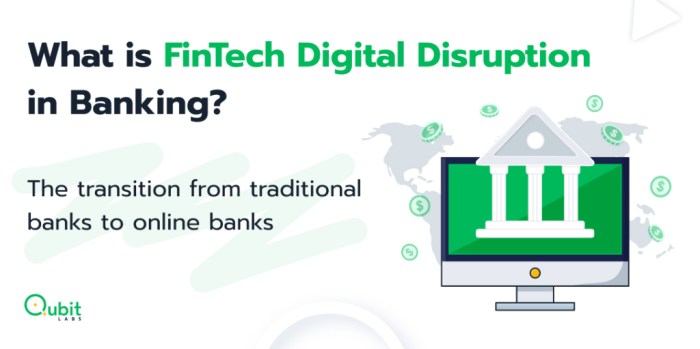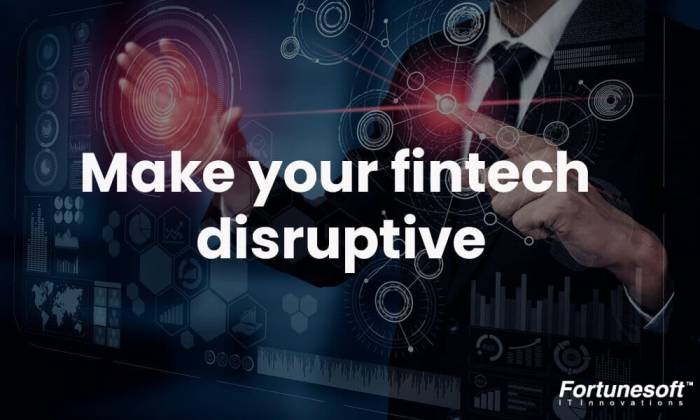
Exploring the world of fintech market disruption unveils a landscape of innovation and transformation. As technology continues to revolutionize traditional financial services, new disruptors are reshaping the industry. Let's delve into the key aspects of this evolving phenomenon.
Overview of Fintech Market Disruption
Fintech market disruption refers to the innovative use of technology to challenge and transform traditional financial services. This disruption is reshaping the way financial transactions are conducted, making processes more efficient, cost-effective, and accessible to a wider range of users.
Reshaping Traditional Financial Services
Fintech companies are leveraging technologies such as blockchain, artificial intelligence, and big data analytics to offer services that were previously dominated by traditional financial institutions. By eliminating the need for physical branches and streamlining operations, fintech disruptors are able to provide faster, more convenient, and often cheaper alternatives to consumers.
- Peer-to-peer lending platforms like LendingClub and Prosper have revolutionized the borrowing and lending process, connecting borrowers directly with investors and cutting out the middleman.
- Robo-advisors such as Wealthfront and Betterment use algorithms to provide automated investment advice, making wealth management more accessible to the masses.
- Mobile payment apps like Venmo and Square Cash have transformed the way people transfer money, simplifying transactions and reducing the reliance on cash and checks.
Factors Driving Fintech Market Disruption

The disruption in the fintech market is being primarily fueled by several key factors that are reshaping the landscape of financial services and technology. These factors are instrumental in driving innovation, enhancing efficiency, and transforming the way financial transactions are conducted.
Role of Technology Advancements
Technology advancements play a pivotal role in accelerating fintech disruption by enabling the development of innovative solutions and platforms. The integration of technologies such as artificial intelligence, blockchain, and cloud computing has revolutionized the way financial services are delivered. These advancements have facilitated faster, more secure, and cost-effective transactions, leading to increased adoption of fintech solutions by businesses and consumers.
- Artificial Intelligence: AI-powered algorithms are being used to automate processes, personalize customer experiences, and enhance decision-making in financial services.
- Blockchain Technology: The decentralized and transparent nature of blockchain technology is revolutionizing areas like payments, smart contracts, and identity verification, eliminating the need for intermediaries.
- Cloud Computing: Cloud-based solutions provide scalability, flexibility, and cost-efficiency, allowing fintech companies to offer innovative services without significant infrastructure investments.
Changing Consumer Behavior
The shifting consumer behavior is a significant driver of fintech market disruption, as customers increasingly prefer digital and mobile-first financial solutions that offer convenience, accessibility, and personalized experiences. This change in behavior has pushed traditional financial institutions to adapt and innovate to meet the evolving needs and expectations of tech-savvy consumers.
- Mobile Payments: The rise of mobile payment apps and digital wallets has transformed the way people conduct transactions, making payments faster, easier, and more secure.
- Personalized Financial Services: Consumers now expect tailored financial products and services that cater to their individual needs and preferences, prompting fintech companies to leverage data analytics and AI to deliver customized solutions.
- Shift to Online Banking: Increasingly, customers are opting for online banking services over traditional brick-and-mortar branches, driving the demand for digital banking solutions that offer seamless and efficient banking experiences.
Impact of Fintech Market Disruption

Fintech market disruption has brought about significant changes in the financial landscape, impacting traditional banking institutions, improving financial inclusion, and presenting challenges to incumbents.
Effects on Traditional Banking Institutions
Traditional banking institutions have faced increased competition from fintech companies offering more efficient and customer-centric services. As a result, banks are forced to adapt by enhancing their digital capabilities, streamlining operations, and focusing on customer experience to remain competitive in the market.
Improvement in Financial Inclusion
Fintech innovations have played a crucial role in improving financial inclusion by providing access to financial services for underserved populations. Through mobile banking, digital payments, and alternative lending platforms, fintech companies have bridged the gap and enabled individuals and businesses to participate in the formal financial system.
Challenges Faced by Incumbents
Incumbent financial institutions are confronted with challenges such as legacy systems, regulatory constraints, and resistance to change in the face of fintech disruption. Adapting to the rapidly evolving digital landscape requires significant investment in technology, talent, and strategic partnerships to stay relevant and competitive.
Trends Shaping the Future of Fintech Market Disruption
The fintech industry is rapidly evolving, driven by various trends that are shaping the future of market disruption. These trends are not only impacting the way financial services are delivered but also influencing the regulatory landscape and fostering collaboration between fintech startups and traditional financial institutions.
Emerging Trends Driving Fintech Market Disruption
- The rise of artificial intelligence and machine learning technologies is revolutionizing the way financial institutions analyze data and provide personalized services to customers.
- Blockchain technology is gaining traction in the fintech space, offering secure and transparent solutions for processes such as payments, identity verification, and smart contracts.
- Robo-advisors are becoming increasingly popular, providing automated investment advice and portfolio management services to a wider range of investors.
Regulatory Implications of Fintech Market Disruption
- Regulators are facing the challenge of keeping pace with the rapid innovation in the fintech industry while ensuring consumer protection and financial stability.
- New regulatory frameworks are being developed to address issues such as data privacy, cybersecurity, and anti-money laundering compliance in the digital financial ecosystem.
- Collaboration between regulators, fintech companies, and traditional financial institutions is essential to create a balanced regulatory environment that fosters innovation while managing risks effectively.
Evolution of Collaboration in Fintech Industry
- Fintech startups are increasingly partnering with traditional financial institutions to leverage their customer base, infrastructure, and regulatory expertise.
- Collaboration models such as open banking and API integration are enabling seamless interactions between fintech platforms and legacy systems, enhancing the overall customer experience.
- Traditional financial institutions are also investing in or acquiring fintech companies to stay competitive and gain access to innovative technologies and business models.
Closure
In conclusion, the fintech market disruption is a dynamic force driving change and innovation in the financial sector. As we navigate through the challenges and opportunities presented by this disruption, it's clear that collaboration and adaptation will be key to shaping the future of finance.
Questions and Answers
What is fintech market disruption?
Fintech market disruption refers to the innovative changes and transformations brought about by technology in the financial services sector, challenging traditional practices.
How is fintech reshaping traditional financial services?
Fintech is reshaping traditional financial services by introducing new ways of conducting transactions, managing investments, and providing financial solutions through digital platforms.
What impact does fintech disruption have on traditional banking institutions?
Fintech disruption poses challenges to traditional banking institutions by changing customer expectations, increasing competition, and requiring them to adapt to technological advancements.
How are fintech innovations improving financial inclusion?
Fintech innovations are improving financial inclusion by providing access to financial services for underserved populations through digital solutions that are more accessible and affordable.
What are some emerging trends driving further disruption in the fintech market?
Emerging trends such as blockchain technology, artificial intelligence, and open banking are driving further disruption in the fintech market by enabling new financial services and business models.










